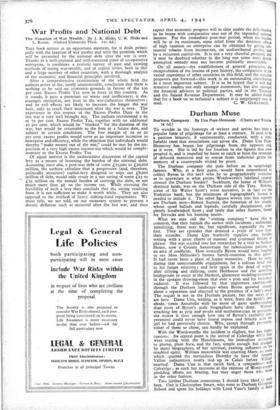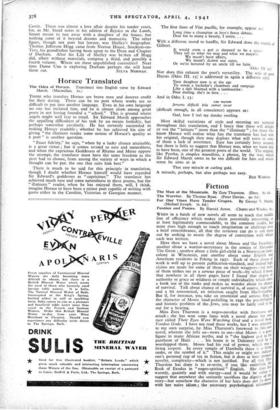Durham Muse
Durham Company. By Una Pope-Hennessy. (Chatto and Windiu. 7s. 6d.)
To wander in the footsteps of writers and artists has been a popular form of pilgrimage for at least a century. It used to be a pastime leisurely, if sentimentally, conducted, with a com- fortable trust that associations can never die. Dame Una Pope- Hennessy has begun her pilgrimage from the opposite end, as it were. She is led by her location to the figures that once peopled it, and is impelled by haste to catch at least the remnants of debased mansions and to rescue from industrial grime the memory of a countryside visited by poets.
The Durham company she puts before us is surprisingly famous. Who, at a first guess, would have remembered to collect Byron in this net? who be so geographically conscious as to appreciate at what points Wordsworth's Lakeland country crossed the Durham border? Sockbum, the home of William's destined bride, was on the Durham side of the Tees. Rokeby, scene of Sir Walter Scott's verse narrative, is in fact on the Yorkshire bank, but the minimum of topographer's licence is needed to include it. The other figures woven into this tapestry are Durham men—Robert Surtees, the historian of his county, whose spoof ballads and legends, carefully documented, com- pletely hoodwinked Scott ; and lastly that other Surtees, famed for Jorrocks and his hunting jaunts.
What we may call the " visiting company " have this in common, that they furnish the author with incidents ; unfinished, tantalising, these may be, but significant, especially the two first. They are episodes that demand a point of view from their recorder. Dame I.kia fearlessly supplies one, besides writing with a great charm of manner and continual felicity of phrase. She was startled into her researches by a visit to Seaham House, now a County Sanatorium for tuberculous patients in an area of coalfields. How ironically Byron would have laughed to see Miss Milbanke's former family-mansion in this guise! It had never been a place of happy memories. Here he went, during that unaccountable engagement, for a tedious brief visit to his future relatives ; and here again in the dead of winter, after dillying and dallying, came Hobhouse and the unwilling bridegroom to assist at the bleakest, glummest wedding-ceremonY in the upstairs drawing-room that ever a poet and his betrothed endured. It was followed by that nightmare carriage-ride through the Durham landscape when Byron growled already about a separation and objected to the presence of a lady's maid. The sequel is not in the Durham picture, but the seeds of Is are here. Dame Una, writing, as it were, from the bride's own abode, treats Annabella with far more of quiet understanding than most of Byron's male biographers have done. Without attacking her as prig and prude and mathematician in petticoats, she makes it clear enough how one of Byron's excitable tem- perament could never have found repose and felicity with the girl he had perversely chosen. Why, except through perversity, either of them so chose, can hardly be explained.
With the Wordsworths the incident is slighter, but has reper- cussions. Its central point is the arrival of Coleridge while they were staying with the Hutchinsons, his immediate attraction to plump, plain Sara, and the fact, simple enough but grudged by many biographers, of her spiritual, exalting influence on his troubled spirit. William meanwhile was courting Mary, an event which spurred the meticulous Dorothy to have the Annette Vallon indiscretion neatly tied up in Calais before Willi° married. Dame Una is that rarish bird, a syinpathiser with Coleridge ; as such her sarcasms at the expense of Wordsworth's plodding efforts are bracing, but may anger those who thin in the other fashion.
Two further Durham connexions I should have liked to meet here. One is Christopher Smart, who went to Durham Grammar School and spent his holidays with Lord Vane's family at ROY Castle. There was almost a love affair despite his tender years, for, as Mr. Stead notes in his edition of Rejoice in the Lamb, Smart meant to run away with a daughter of the house, but nothing came of it beyond dreams and memories. The other figure, though not poet but lawyer, was Shelley's biographer. Thomas Jefferson Hogg came from Norton House, Stockton-on- Tees, his grandfather having been agent to the Dean and Chapter of Durham. After his Life of Shelley was broken off Hogg did, albeit without materials, compose a third, and possibly a fourth volume. Where are these unpublished curiosities? Next time Dame Una is exploring Durham perhaps she will hunt



























 Previous page
Previous page